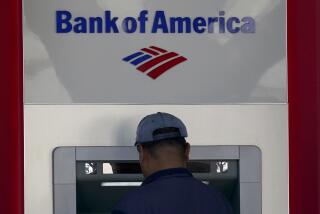BankAmerica Covers Loss of $17.4 Million in Money Fund : Investments: It becomes the latest institution to take a derivatives-related hit. Industry experts see no sign of crisis.
- Share via
BankAmerica Corp. has become the latest mutual fund sponsor to cover shareholder losses caused by so-called derivative securities--in this case, in a money market fund, BofA confirmed Friday.
But while more such disclosures are expected from normally “safe” money funds between now and the end of the quarter, industry experts and regulators say the funds’ problems appear manageable and are unlikely to be widespread.
“We don’t see this as a major crisis,” one Securities and Exchange Commission official in Washington said.
BofA confirmed that it injected $17.4 million into its Pacific Horizon Prime Money Market fund in May to cover losses on securities the fund was forced to sell at a loss before they matured.
The cash injection allowed the fund to keep its share price constant at $1, which is one of the hallmarks of money funds.
Generally, money fund shareholders expect the value of their principal to remain steady; fund managers normally maintain share price stability by limiting their investments to fixed-income securities maturing within an average of 90 days.
But the Pacific Horizon Prime fund--used mostly by institutional investors--suffered a double whammy in March and April, BofA said. As short-term market interest rates zoomed, hordes of its institutional holders pulled their cash out of the fund to invest directly in money market securities.
The fund’s assets have plunged from a peak of $12 billion earlier in the year to $4.6 billion now.
Forced to liquidate securities to meet redemptions, the fund suffered losses on certain investments that had dropped in value because their yields were less than what was available on the open market, as rates spiked.
BofA said those securities included some money market “derivatives”--hybrid, often volatile investments whose returns are derived from, or tied to, interest rate trends. The company would not identify the specific derivatives.
Industry analysts say it is typical for institutional money funds to experience outflows in times of rising interest rates as big investors buy securities directly.
But some analysts questioned why the Pacific Horizon fund, which is accustomed to heavy inflows and outflows of cash, would risk investment in derivative money market instruments that are generally higher-risk.
“It sounds like they were buying securities inappropriate for” them, said one rival money fund manager who requested anonymity.
A BofA spokesman in San Francisco asserted that “it wouldn’t have mattered what we had in the portfolio,” because the surge in market interest rates, coupled with dramatic redemptions, forced the fund into a loss situation.
Some analysts disputed that, noting that the Pacific Horizon fund’s yield has been above average all year, which by definition means the fund is taking above-average risk. The current yield on the fund is 3.74%, compared to a 3.57% average for all money funds, according to fund tracker IBC/Donoghue in Ashland, Mass.
Over the past two months, several other funds have incurred interest-rate-related losses that have been covered by their parent companies.
In May, oil giant Atlantic Richfield Co. said it would make up a $22-million loss caused by derivative securities in a money-market-like employee retirement fund.
And this week, brokerage Paine Webber Group Inc. agreed to put $33 million into a government bond fund it manages, in order to repay investors for derivative-related losses incurred as interest rates rose.
Federal regulators note that there have been other cases in recent years--involving money funds in particular--of unusual losses being covered to avoid angering shareholders.
SEC officials say they believe that a relatively small number of money funds have covered minor losses this spring but that they have no reason to believe the problems are endemic in the money fund business, given the generally conservative nature of most such funds.
More to Read
Inside the business of entertainment
The Wide Shot brings you news, analysis and insights on everything from streaming wars to production — and what it all means for the future.
You may occasionally receive promotional content from the Los Angeles Times.










